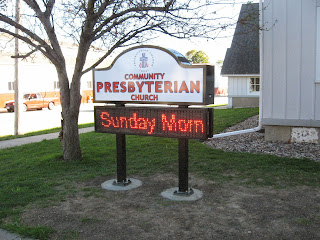Psalm 150
in honor of 150 years
of being
Community Presbyterian
Church
Praise the Lord!
Praise God in his sanctuary; praise him in his mighty
firmament!
Praise him for his mighty deeds; praise him according to his
surpassing greatness!
Praise him with trumpet sound; praise him with lute and
harp!
Praise him with tambourine and dance; praise him with
strings and pipe!
Praise him with clanging cymbals; praise him with loud
clashing cymbals!
Let everything that breathes praise the Lord!
Praise the Lord!
To this wonderful Psalm of praise, I would add: “Praise God
with the bell; praise him with the resounding noise of the big bell.”
As I reflect on Community Presbyterian Church’s 150th
Anniversary Celebration, I am grateful. I am grateful for the call to serve in
such a time and place. It has been truly humbling to be pastor of Community
Presbyterian Church during this wonderful and joyous celebration.
There are many, many people who need to be thanked for their
contribution to the celebration. Thank you to Tom and Diane Ellringer who
hosted a church social. Your farm was the perfect place to gather for bean bags
and kick ball; for hayrides and bonfires; for food, fellowship and s’mores.
Thank you for your hospitality.
Thank you to Bonnie Bosma for designing and dedicating a new
quilt for the sanctuary. Your skill is unmatched and your creativity adds to
the beauty of our sacred space.
Thank you to the members of the Praise Band – Steve Kreofsky,
Alan Dewey, Joan Lee, Erica Huag-Gonzalez, Belinda Strain, Meg Curtiss, Peggy
Veith and Betsy Dewey for leading us in a Sunday of new songs (and for Bruce Firzlaff for running the sound system!).
Thank you to Janice Jurgenson, Ron Manzow, and Donna
Christison for planning and organizing our Community Concert. Thank you to our
musicians Ron Manzow, Nancy Hollister, Holly Reeve, the Men’s Choir, Meg Curtiss,
Steve Kreofsky for sharing your music with us. Thank you to Bruce Firzlaff for your help with the sound system. A special thanks to our new
choir director Peggy Veith and all the members of the adult choir for singing
and sharing your gifts. Thank you to Dianne Lutzi for serving the ice cream
after the concert.
Thank you to Pastors Paul Moore and Chaz Ruark for helping
lead worship on the day we dedicated the bell and remembered our great history. Thank you to Alan Dewey for videotaping the events of the day. Thank you to Ron Manzow for writing and directing our cemetery walk – and to
the following people who memorized ghost stories: Larry Veith, John Zabel,
Dianne Lutzi, Meg Curtiss, Walt Christison, and Kent Harrington.
Thank you to the 150th Anniversary Task Force,
for your wisdom and enthusiasm as we met for over a year to plan for this special
event: Ron Manzow, Dianne Lutzi, Donna Christison, Ardie and Janice Jurgenson,
Wally and Gladys Richardson, Joan Lee, and Dennis and Bonnie Bosma.
An extra big thanks to Stephanie Kreofsky who served as the
chairperson of the 150th Anniversary Task Force. Thank you for your
gentle guidance which kept us on track and for you wise leadership in moving us
forward.
Thank you to Steve Kreofsky, for taking the idea of a new
sign and a bell platform for our historic bell and designing and building a beautiful
structure. Thank you for donating your time and laboring in love so that our
bell could ring once again.
And finally, thank you, members and friends of Community Presbyterian
Church for your tremendous support of our 150th Anniversary plans.
You generous supported our fundraising efforts with your time and your
resources. Your faithfulness gives me hope in what God is continuing to do through
the witness and ministry of Community Presbyterian Church. May the sound of our
bell renew your spirit and deepen your faith in Jesus Christ.
When I think about 150 years of ministry, I realize that I
have been the pastor of Community Presbyterian Church for less than 2% of her
history (I’ve been here since 2011 – a little more than 2 years). It is
humbling to stand on the shoulders of those saints of God who have gone before
me. But upon those shoulders I can see a bit better. Grounded in the history of
who we are, this vision enables me to see a future where God continues to bless
the people of Community Presbyterian Church. Let us live together into that
glorious future – a future God has prepared for us; a future that God is
leading us towards.
Praise God for the sound of our historic bell, ringing once
again. May it call all of us into a deeper faith and a more meaningful worship
as a community of faith; as Community Presbyterian Church.
Glory to God –
Pastor John






